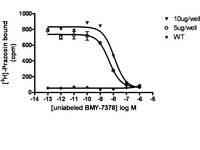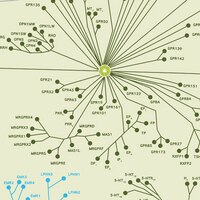Two alpha1-adrenergic receptor subtypes regulating the vasopressor response have differential roles in blood pressure regulation.
Hosoda, Chihiro, et al.
Mol. Pharmacol., 67: 912-22 (2005)
2004
Show Abstract
To study the functional role of individual alpha1-adrenergic (AR) subtypes in blood pressure (BP) regulation, we used mice lacking the alpha1B-AR and/or alpha1D-AR with the same genetic background and further studied their hemodynamic and vasoconstrictive responses. Both the alpha1D-AR knockout and alpha1B-/alpha1D-AR double knockout mice, but not the alpha1B-AR knockout mice, had significantly (p < 0.05) lower levels of basal systolic and mean arterial BP than wild-type mice in nonanesthetized condition, and they showed no significant change in heart rate or in cardiac function, as assessed by echocardiogram. All mutants showed a significantly (p < 0.05) reduced catecholamine-induced pressor and vasoconstriction responses. It is noteworthy that the infusion of norepinephrine did not elicit any pressor response at all in alpha1B-/alpha1D-AR double knockout mice. In an attempt to further examine alpha1-AR subtype, which is involved in the genesis or maintenance of hypertension, BP after salt loading was monitored by tail-cuff readings and confirmed at the endpoint by direct intra-arterial recording. After salt loading, alpha1B-AR knockout mice developed a comparable level of hypertension to wild-type mice, whereas mice lacking alpha1D-AR had significantly (p < 0.05) attenuated BP and lower levels of circulating catecholamines. Our data indicated that alpha1B- and alpha1D-AR subtypes participate cooperatively in BP regulation; however, the deletion of the functional alpha1D-AR, not alpha1B-AR, leads to an antihypertensive effect. The study shows differential contributions of alpha1B- and alpha1D-ARs in BP regulation. | 15598970
 |














